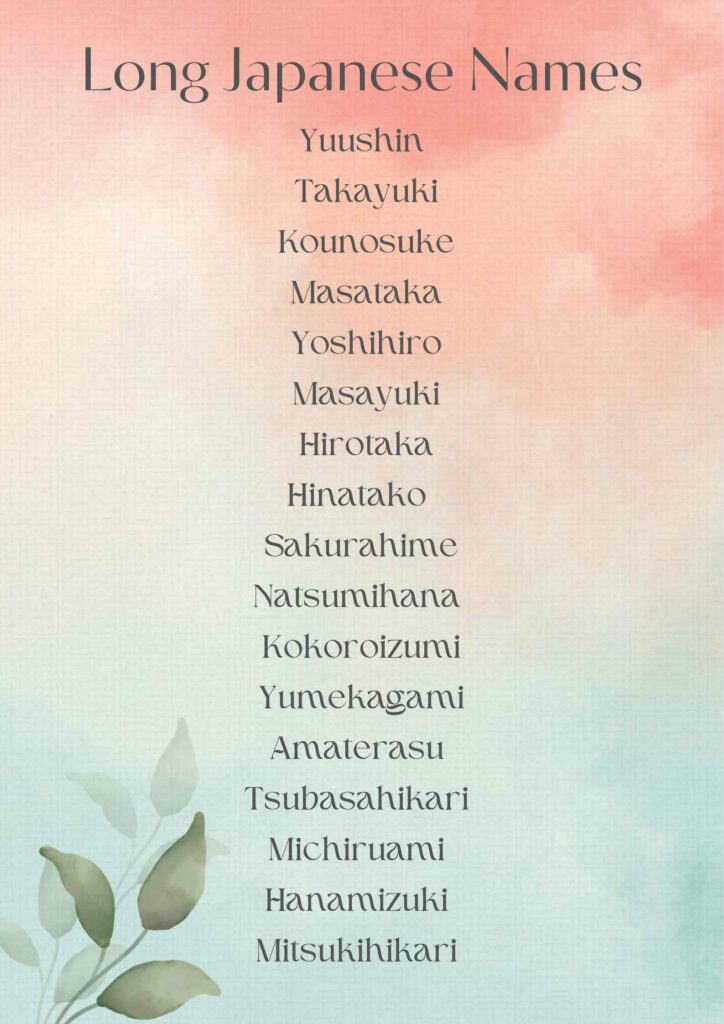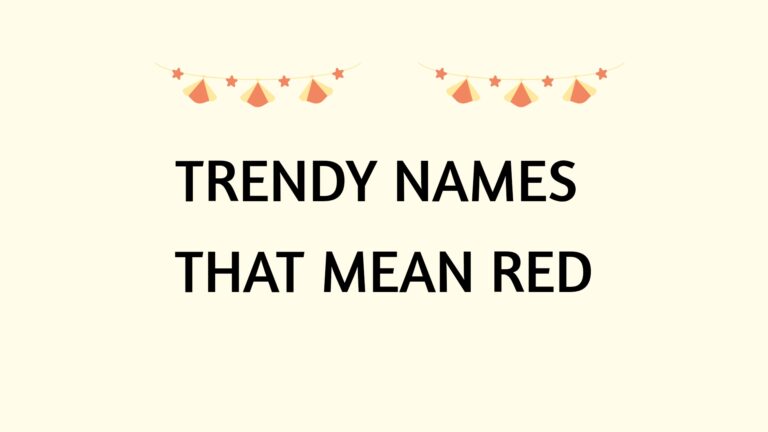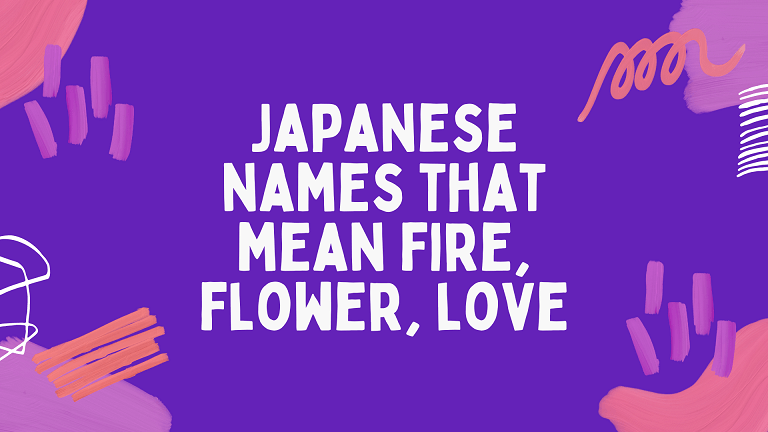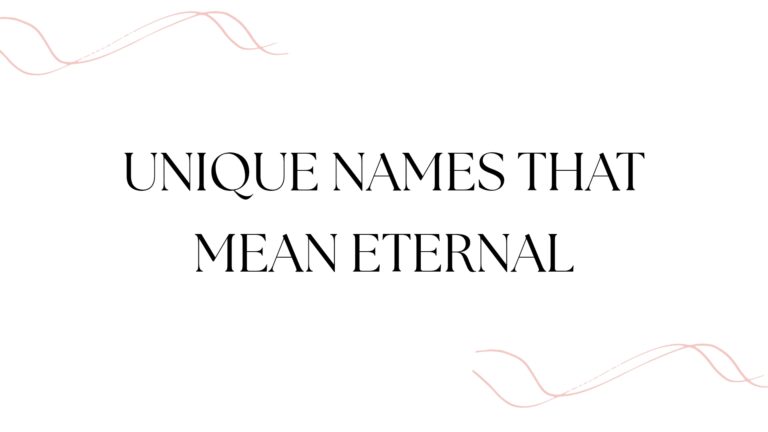70 Cool Long Japanese Names
Are you looking for a list of long Japanese names? If so, you’ve come to the perfect place to find them.
In every language, there are both short and long names, and it’s up to the parents to decide which to use. Usually, parents prefer aesthetic, meaningful, and short names over long ones.
However, being unique is not a bad thing; in fact, it is necessary when choosing a baby name. Moreover, Japanese names have been the most popular choice among parents for many years.
You may wonder what makes Japanese names so popular. It’s simple: their unique Japanese culture, distinct habits, and the aesthetic nature of their names.
Now, let’s explore the names listed below.
Long Japanese Boy Names
Kousuke (康介): “Kou” means “peace” or “tranquility,” and “suke” means “assist” or “help” and it can be understood as “helper of peace” or “assisting in tranquility.”
Yoshiki (芳樹): “Yoshi” means “good” or “virtuous,” and “ki” means “tree” and it can be interpreted as a “virtuous tree.”
Akihiro (明宏): “Aki” means “bright” or “clear,” and “hiro” means “abundant” or “prosperous” and Akihiro can be seen as “bright and prosperous” or “abundant clarity.”
Mitsuki (光希): “Mitsu” means “light” or “hope,” and “ki” means “hope” or “aspire.”
Masahiro (正宏): “Masa” means “correct” or “just,” and “hiro” means “abundant” or “prosperous.”
Koutarou (康太郎): “Kou” means “peace” or “tranquility,” and “tarou” is a common suffix for boys’ names.
Hiroshi (寛): This name means “generous” or “tolerant.”
Ryousuke (良介): “Ryou” means “good” or “excellent,” and “suke” means “assist” or “help.”
Yoshiaki (吉秋): “Yoshi” means “good” or “lucky,” and “aki” means “autumn” and Yoshiaki can be interpreted as “lucky autumn.”
Satoshi (聡): Satoshi means “intelligent” or “wise.”
Koushin (康信): “Kou” means “peace” or “tranquility,” and “shin” means “trust” or “faith” and this name can be seen as “peaceful trust” or “trustworthy peace.”
Takahiro (隆宏): “Taka” means “prosperity” or “noble,” and “hiro” means “abundant” or “prosperous.”
Takashi (隆): Takashi means “prosperity” or “noble.”
Yuusuke (裕介): “Yuu” means “abundant” or “rich,” and “suke” means “assist” or “help.”
Yoshitaka (吉隆): “Yoshi” means “good” or “virtuous,” and “taka” means “noble” or “prosperous.”
Yoshinori (吉則): “Yoshi” means “good” or “lucky,” and “nori” means “rule” or “law.”
Keisuke (慶介): “Kei” means “celebration” or “joy,” and “suke” means “assist” or “help.”
Hiroaki (寛明): “Hiro” means “generous” or “tolerant,” and “aki” means “bright” or “clear.”
Koushirou (康士郎): “Kou” means “peace” or “tranquility,” and “shirou” is a common suffix for boys’ names.
Kenshin (謙信): “Ken” means “modesty” or “humble,” and “shin” means “trust” or “faith.”
Yuushin (悠真): “Yuu” means “distant” or “leisurely,” and “shin” means “real” or “genuine” and this name can be interpreted as “genuine leisure” or “sincerity.”
Takayuki (孝行): “Taka” means “filial piety” or “respect,” and “yuki” means “courage.”
Kounosuke (幸之助): “Kou” means “happiness” or “blessing,” and “nosuke” is a common suffix for boys’ names.
Masataka (正隆): “Masa” means “correct” or “just,” and “taka” means “prosperity” or “noble.”
Yoshihiro (良博): “Yoshi” means “good” or “virtuous,” and “hiro” means “abundant” or “prosperous.”
Masayuki (雅行): “Masa” means “elegant” or “graceful,” and “yuki” means “courage.”
Hirotaka (宏孝): “Hiro” means “generous” or “tolerant,” and “taka” means “filial piety” or “respect.”
Kyousuke (恭輔): “Kyou” means “respectful” or “reverent,” and “suke” means “assist” or “help.”
Shinnosuke (信之助): “Shin” means “trust” or “faith,” and “nosuke” is a common suffix for boys’ names.
Takamasa (孝昌): “Taka” means “filial piety” or “respect,” and “masa” means “prosperity.”
Syunsuke (俊介): “Shun” means “excellent” or “smart,” and “suke” means “assist” or “help.”
Masanori (正則): “Masa” means “correct” or “just,” and “nori” means “rule” or “law.”
Takayoshi (孝善): “Taka” means “filial piety” or “respect,” and “yoshi” means “goodness” or “virtue.”
Masayoshi (正義): “Masa” means “correct” or “just,” and “yoshi” means “righteousness” or “justice.”
Ryoutarou (亮太郎): “Ryou” means “bright” or “clear,” and “tarou” is a common suffix for boys’ names.
Yoshiyuki (善行): “Yoshi” means “good” or “virtuous,” and “yuki” means “courage.”
Yuunosuke (勇之助): “Yuu” means “courage” or “bravery,” and “nosuke” is a common suffix for boys’ names.
Yoshimasa (良政): “Yoshi” means “good” or “virtuous,” and “masa” means “politics” or “government.”
Takatoshi (孝俊): “Taka” means “filial piety” or “respect,” and “toshi” means “smart” or “intelligent.”
Yoshihisa (良久): “Yoshi” means “good” or “virtuous,” and “hisa” means “long-lasting” or “forever” and Yoshihisa can be interpreted as “goodness lasting forever.”
ALSO READ: Short Japanese Names
Long Japanese Girl Names
Yuushin (悠真): “Yuu” means “distant” or “leisurely,” and “shin” means “real” or “genuine.” and it can be interpreted as “genuine leisure” or “sincerity.”
Takayuki (孝行): “Taka” means “filial piety” or “respect,” and “yuki” means “courage.”
Masataka (正隆): “Masa” means “correct” or “just,” and “taka” means “prosperity” or “noble.”
Yoshihiro (良博): “Yoshi” means “good” or “virtuous,” and “hiro” means “abundant” or “prosperous.”
Masayuki (雅行): “Masa” means “elegant” or “graceful,” and “yuki” means “courage.”
Hirotaka (宏孝): “Hiro” means “generous” or “tolerant,” and “taka” means “filial piety” or “respect.”
Kyousuke (恭輔): “Kyou” means “respectful” or “reverent,” and “suke” means “assist” or “help.”
Takamasa (孝昌): “Taka” means “filial piety” or “respect,” and “masa” means “prosperity.”
Syunsuke (俊介): “Shun” means “excellent” or “smart,” and “suke” means “assist” or “help.”
Masanori (正則): “Masa” means “correct” or “just,” and “nori” means “rule” or “law.”
Takayoshi (孝善): “Taka” means “filial piety” or “respect,” and “yoshi” means “goodness” or “virtue.”
Masayoshi (正義): “Masa” means “correct” or “just,” and “yoshi” means “righteousness” or “justice.”
Yoshiyuki (善行): “Yoshi” means “good” or “virtuous,” and “yuki” means “courage.”
Yoshimasa (良政): “Yoshi” means “good” or “virtuous,” and “masa” means “politics” or “government.”
Takatoshi (孝俊): “Taka” means “filial piety” or “respect,” and “toshi” means “smart” or “intelligent.”
Yoshihisa (良久): “Yoshi” means “good” or “virtuous,” and “hisa” means “long-lasting” or “forever.”
Harukaze (春風): This name means “spring breeze.”
Amane (雨音): Amane signifies the “sound of rain.”
Sakurako (桜子): “Sakura” means “cherry blossom,” and “ko” means “child,” making it “child of cherry blossoms.”
Tsubasa (翼): Tsubasa translates to “wings.”
Mitsuki (美月): “Mitsu” means “beautiful,” and “tsuki” means “moon.”
Kiyomi (清美): “Kiyo” means “pure” or “clean,” and “mi” means “beauty.”
Natsumi (夏美): “Natsu” means “summer,” and “mi” means “beauty.”
Satsuki (五月): Satsuki is the Japanese name for the month of May.
Chiyoko (千代子): “Chiyo” means “eternal,” and “ko” means “child.”
Hatsune (初音): “Hatsu” means “first,” and “ne” means “sound,” often associated with “first sound” or “the beginning of sound.”
Miyuki (美雪): “Miyu” means “beautiful,” and “yuki” means “snow.”
Kanade (奏): Kanade translates to “play a musical instrument” or “to sing.”
Nanami (七海): “Nana” means “seven,” and “mi” means “sea,” signifying “seven seas.”
Yukiko (雪子): “Yuki” means “snow,” and “ko” means “child,” making it “child of snow.”
ALSO READ: Japanese American Names

That’s all for long Japanese names; I hope you loved the listed names.







